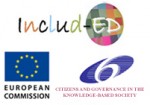The European Sociological Association (ESA) aims to facilitate sociological research, teaching and communication on European issues, and to give sociology a voice in European affairs. This year the 9th European Sociological Association Conference was held between the 2nd and the 5th of September 2009, in Lisbon, Portugal, under the general title of “European Society or European Societies”?
Parts of the INCLUD-ED Integrated Project (FP6, 2006-2011) results were presented at this conference in the Research Network Sociology of Education. Members of the Include-Ed Project presented two papers about the findings obtained during the first year in relation to European Educational Systems and successful practices which increase equity and efficiency in education. Lídia Puigvert (member of the General Coordination team) and Adriana Aubert from the University of Barcelona presented a paper written in collaboration with partners Laura Engels (University of Nottingham, United Kingdom) and Teodor Alexiu Mircea (Universitatea de Vest din Timisoara, Romania) entitled “Overcoming educational inequalities: Differences between mixture, streaming and inclusion” on September the 4th, 2009.
The paper presented involved a large public dissemination of knowledge. Three different ways of organizing students and the available human resources in schools have been identified by the Includ-ed project: mixture, streaming and inclusion. Mixture refers to traditional classrooms based on mixed ability, with only one teacher per class. It has been demonstrated that “mixture” is unable to respond appropriately to the different needs of the students. As a result, streaming measures were introduced into many educational systems. However, streaming has a negative impact on instrumental areas of learning, since it organizes students according to ability level. Inclusionary measures are seen as an alternative to mixture and streaming. Inclusion is defined as the organisation of students into heterogeneous groups with additional resources, drawing from the human resources available in the schools. Although diversity is a predominant reality in European Educational Systems schools still need to find different inclusionary strategies to tackle it. The intention of the presentation was to clarify these different ways of organising students and the impact they have on schools.
Another paper entitled “Beyond state boundaries: Identifying common elements from effective educational practices” was presented on the 3rd of September by Dr. Esther Oliver (Include-Ed project researcher and member of the CREA team). This paper was co-authored by Katriina Kaalikoski (University of Helsinki, Finland), Liga Krastina (Baltic Institute of Social Sciences, Latvia) and Marlen Mendoza (University of Barcelona). The presentation was focused on the political impact of the Includ-ed project and the successful educational strategies identified in project 2, for example: organising the students into heterogeneous groups with additional resources.
Different specialists from universities across Europe attended this session on educational policies.
